GDPR, kort för General Data Protection Regulation, är en EU-lag som skyddar användarnas integritet när de använder webbplatser.
Vi har fått dussintals e-postmeddelanden från användare som ber oss förklara GDPR på enkel svenska och dela tips om hur man gör din WordPress-webbplats GDPR-kompatibel.
I den här artikeln förklarar vi allt du behöver veta om GDPR och WordPress (utan det komplicerade juridiska snacket).
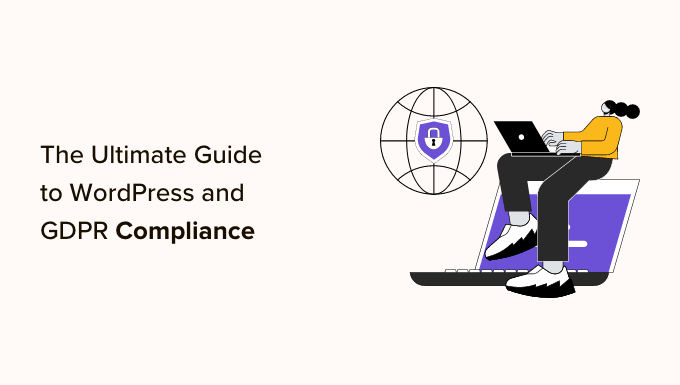
Ansvarsfriskrivning
Vi är inte jurister, och inget på denna webbplats bör betraktas som juridisk rådgivning.
För att hjälpa dig att enkelt navigera genom vår ultimata guide till WordPress och GDPR-efterlevnad, har vi skapat en innehållsförteckning nedan:
- Vad är GDPR?
- Gäller GDPR för min WordPress-webbplats?
- Vad krävs av webbplatsägare enligt GDPR?
- Är WordPress GDPR-kompatibelt?
- Ytterligare områden på din webbplats att kontrollera för GDPR-efterlevnad
- Bästa WordPress-plugins för GDPR-efterlevnad
- Slutliga tankar
- Experthandledningar för att göra din WordPress-webbplats GDPR-kompatibel
- Ytterligare resurser
Vad är GDPR?
General Data Protection Regulation (GDPR) är en lag inom Europeiska unionen (EU) som trädde i kraft den 25 maj 2018. Målet med GDPR är att ge EU-medborgare kontroll över sina personuppgifter och att förändra integritetsstrategin för organisationer över hela världen.
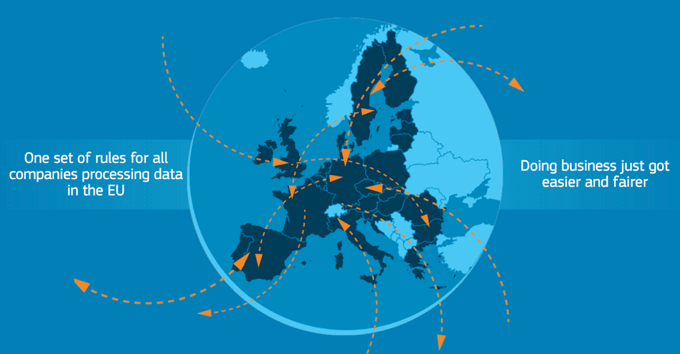
Under åren har du förmodligen fått dussintals e-postmeddelanden från företag som Google om GDPR, deras nya integritetspolicyer och en massa annat juridiskt material. Det beror på att EU har infört stora böter för personer som inte följer reglerna.
Företag som inte följer GDPR:s krav kan drabbas av höga böter på upp till 4 % av ett företags årliga globala intäkter eller 20 miljoner euro (det som är högst). Detta är tillräckligt skäl för att orsaka utbredd panik bland företag runt om i världen.
Vad är CCPA?
Staten Kalifornien införde liknande integritetslagstiftning den 1 januari 2020, även om de potentiella böterna är mycket lägre.
California Consumer Privacy Act (CCPA) är utformad för att skydda personuppgifter för invånare i Kalifornien. Den ger dem rätt att veta vilka personuppgifter som samlas in om dem, begära dess radering och välja bort försäljningen av sina data.
I den här artikeln fokuserar vi på GDPR, men många av stegen vi listar i den här artikeln kommer också att hjälpa dig att bli CCPA-kompatibel.
Detta leder oss till den stora frågan som du kanske funderar på:
Gäller GDPR för min WordPress-webbplats?
Svaret är JA. Det gäller alla företag, stora som små, runt om i världen (inte bara inom Europeiska unionen).
Om din WordPress-webbplats har besökare från EU-länder, då gäller denna lag för dig.
Men tappa inte modet. Det är inte världens undergång.
Även om GDPR kan eskalera till dessa höga bötesnivåer, kommer det att börja med en varning, sedan en tillrättavisning och sedan ett avbrott i databehandlingen.
Och först om du fortsätter att bryta mot lagen kommer de stora böterna att drabba.
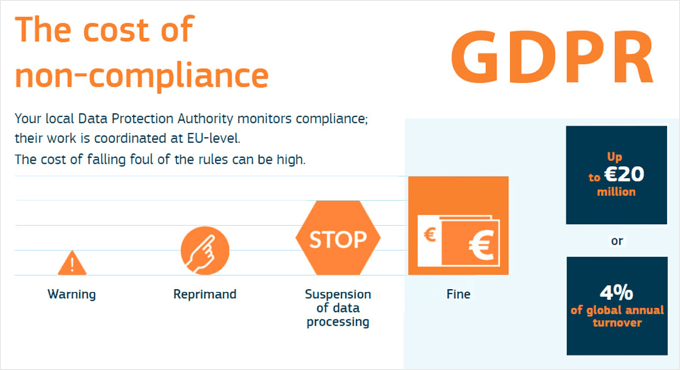
EU är inte någon ond regering ute efter dig. Dess mål är att skydda oskyldiga konsumenter från hänsynslös datahantering som kan leda till ett intrång i deras integritet.
Enligt vår mening är den maximala bötesbeloppet till stor del avsett att få uppmärksamheten från stora företag som Facebook och Google så att denna förordning INTE ignoreras. Dessutom uppmuntrar detta företag att faktiskt lägga mer vikt vid att skydda människors rättigheter.
När du väl förstår vad som krävs av GDPR och lagens anda, då kommer du att inse att inget av detta är för galet.
Vi kommer också att dela verktyg och tips för att göra din WordPress-webbplats GDPR-kompatibel.
Vad krävs av webbplatsägare enligt GDPR?
Målet med GDPR är att skydda användarnas personligt identifierbara information (PII) och ställa högre krav på företag när det gäller hur de samlar in, lagrar och använder denna data.
Dessa personuppgifter inkluderar dina användares namn, e-postadresser, fysiska adresser, IP-adresser, hälsouppgifter, inkomst och mer.
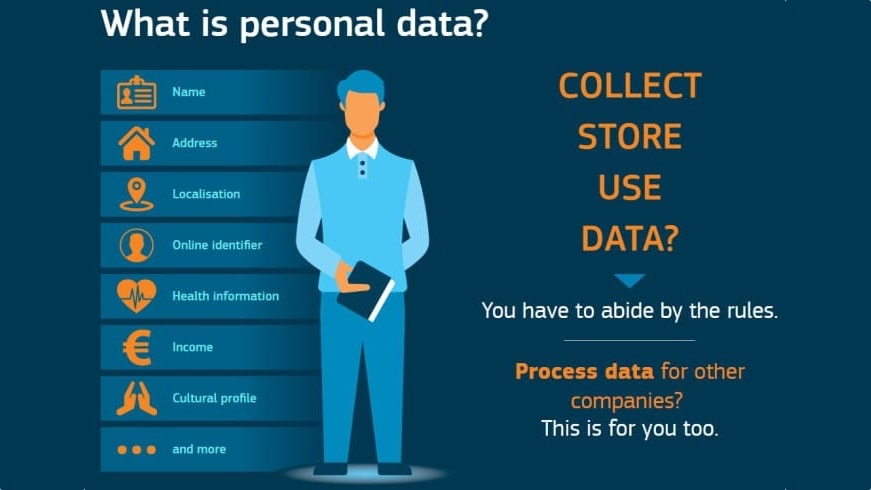
Även om GDPR-förordningen är 200 sidor lång, här är de viktigaste pelarna som du behöver känna till:
Du måste få uttryckligt samtycke för att samla in personlig information
Om du samlar in personuppgifter från en EU-invånare måste du inhämta uttryckligt, specifikt och otvetydigt samtycke eller tillstånd.
Med andra ord kan du inte bara skicka oönskade e-postmeddelanden till någon som gav dig deras visitkort eller fyllde i ditt webbplatsformulär. Detta är spam. Istället måste du låta dem anmäla sig till ditt marknadsföringsnyhetsbrev.
För att det ska anses vara uttryckligt samtycke måste du kräva ett positivt val. Kryssrutan får inte vara förbockad som standard, måste innehålla tydlig formulering (ingen juridisk jargong) och måste vara separat från andra villkor.
Dina användare har rätt till sina personuppgifter
Du måste informera individer om var, varför och hur deras data behandlas och lagras.
En individ har rätt att ladda ner sina personuppgifter och rätten att bli glömd.
Detta innebär att de har rätt att kräva att du raderar deras personuppgifter. När en användare klickar på en avregistreringslänk eller ber dig att radera sin profil, måste du faktiskt göra det.
Du måste ge snabba meddelanden om dataintrång
Organisationer måste rapportera vissa typer av dataintrång till relevanta myndigheter inom 72 timmar, såvida inte intrånget anses ofarligt och inte utgör någon risk för individens data.
Om ett intrång dock är av hög risk, då måste företaget också omedelbart informera de individer som påverkas.
Detta kommer förhoppningsvis att förhindra mörkläggningar som Yahoo, som inte avslöjades förrän vid förvärvet.
Du kan behöva utse en dataskyddsombud
Om du är ett publikt företag eller behandlar stora mängder personlig information, då måste du utse ett dataskyddsombud.
Detta krävs inte för småföretag. Rådgör med en advokat om du är osäker.
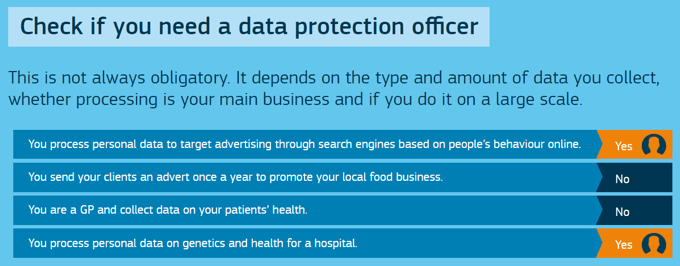
Sammanfattning på enkel svenska av vad som krävs
För att uttrycka det på enkel svenska, ser GDPR till att företag inte kan spam-posta folk genom att skicka dem e-postmeddelanden de inte bett om. Företag kan inte heller sälja folks data utan deras uttryckliga samtycke.
Företag måste radera användarkonton och avregistrera dem från e-postlistor när de blir ombedda. Företag måste också rapportera dataintrång och generellt sett vara bättre på dataskydd.
Låter ganska bra, åtminstone i teorin.
Men du undrar förmodligen vad du behöver göra för att säkerställa att din WordPress-webbplats är GDPR-kompatibel.
Tja, det beror verkligen på din specifika webbplats (mer om detta senare).
Låt oss börja med att besvara den största frågan som vi har fått från användare:
Är WordPress GDPR-kompatibelt?
Ja, WordPress kärnprogramvara har varit GDPR-kompatibel sedan WordPress 4.9.6, som släpptes den 17 maj 2018. Flera GDPR-förbättringar lades till för att uppnå detta.
Det är viktigt att notera att när vi pratar om WordPress, menar vi självhostad WordPress.org. Detta skiljer sig från WordPress.com, och du kan lära dig skillnaden i vår guide om WordPress.com vs. WordPress.org.
Med det sagt, på grund av webbplatsers dynamiska natur kan ingen enskild plattform, plugin eller lösning erbjuda 100 % GDPR-efterlevnad. Processen för GDPR-efterlevnad varierar beroende på vilken typ av webbplats du har, vilken data du lagrar och hur du behandlar data på din webbplats.
Okej, så du kanske tänker, vad betyder det här på klar svenska?
Som standard kommer WordPress med följande verktyg för GDPR-förbättring:
Samtyckes-checkbox för kommentarer
Före maj 2018 lagrade WordPress som standard kommentatorns namn, e-postadress och webbplats som en cookie i användarens webbläsare. Detta gjorde det enklare för användare att lämna kommentarer på sina favoritbloggar eftersom dessa fält var förifyllda.
På grund av GDPR:s krav på samtycke har WordPress lagt till en samtyckesruta till kommentarsformuläret.

Användaren kan lämna en kommentar utan att kryssa i denna ruta. De måste dock manuellt ange sitt namn, e-postadress och webbplats varje gång de gör det.
Tips: Se till att du är utloggad när du testar för att se om kryssrutan finns där.
Om kryssrutan fortfarande inte visas, är det troligt att ditt tema åsidosätter standardkommentarsformuläret i WordPress. Här är en steg-för-steg-guide om hur du lägger till en GDPR-kommentar-integritets-kryssruta i ditt WordPress-tema.
Funktioner för export och radering av personuppgifter
WordPress erbjuder webbplatsägare de verktyg de behöver för att följa GDPR:s krav på datahantering och uppfylla användarnas begäran om export av personuppgifter samt borttagning av användares personuppgifter.
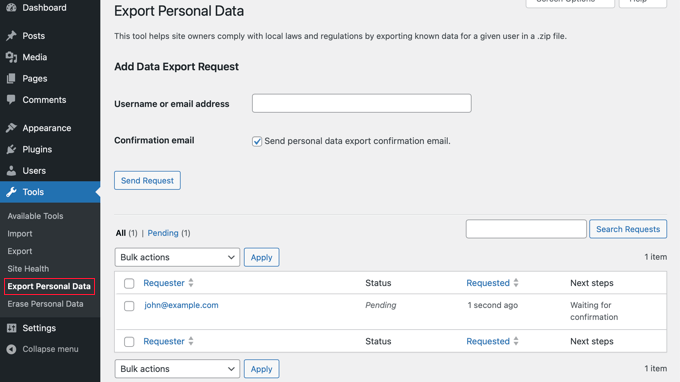
Datahanteringsfunktionerna finns under menyn Verktyg i WordPress-admin. Härifrån kan du gå till Exportera personuppgifter eller Radera personuppgifter.
Generera integritetspolicy
WordPress levereras med en inbyggd generator för integritetspolicy. Den har en färdig mall för integritetspolicy och ger dig vägledning om vad mer du ska lägga till. Detta hjälper dig att vara mer transparent med användarna när det gäller vilken data du lagrar och hur du hanterar deras data.
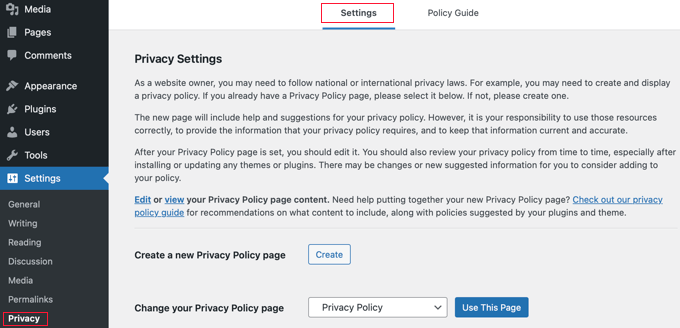
Du kan läsa mer i vår guide om hur man skapar en integritetspolicy i WordPress.
Dessa tre funktioner räcker för att göra en standard WordPress-blogg GDPR-kompatibel. Din webbplats kommer dock sannolikt att ha ytterligare områden som också måste vara i enlighet med reglerna.
Ytterligare områden på din webbplats att kontrollera för GDPR-efterlevnad
Som webbplatsägare kan du använda olika WordPress-plugins som lagrar eller behandlar data, och dessa kan påverka din GDPR-efterlevnad. Vanliga exempel inkluderar:
Beroende på vilka WordPress-plugins du använder på din webbplats måste du agera därefter för att säkerställa att din webbplats är GDPR-kompatibel.
Många av de bästa WordPress-pluginsen har lagt till funktioner för GDPR-förbättringar. Låt oss titta på några av de vanliga områden som du behöver ta itu med.
Google Analytics
Liksom de flesta webbplatsägare använder du förmodligen Google Analytics för att få statistik över webbplatsen. Det innebär att du kan samla in eller spåra personuppgifter som IP-adresser, användar-ID, cookies och andra data för beteendeprofilering.
För att vara GDPR-kompatibel måste du göra ett av följande:
- Anonymisera data innan lagring och bearbetning påbörjas.
- Lägg till ett överlägg som meddelar om cookies och ber användare om samtycke innan spårning.
Båda dessa är ganska svåra att göra om du bara klistrar in Google Analytics-kod manuellt på din webbplats. Men om du använder MonsterInsights, det mest populära Google Analytics-pluginet för WordPress, då har du tur.
De har släppt en EU-compliance-tillägg som hjälper till att automatisera ovanstående process.

MonsterInsights har också ett mycket bra blogginlägg som handlar om GDPR och Google Analytics. Detta är ett måste att läsa om du använder Google Analytics på din webbplats.
Kontaktformulär
Om du använder ett kontaktformulär i WordPress, då kan du behöva lägga till extra transparensåtgärder. Detta gäller särskilt om du lagrar formulärinlägg eller använder data för marknadsföringsändamål .
Här är några saker att tänka på när du gör dina WordPress-formulär GDPR-kompatibla:
- Få uttryckligt samtycke från användare för att lagra deras information.
- Få uttryckligt samtycke från användare om du planerar att använda deras data för marknadsföringsändamål, till exempel att lägga till dem i din e-postlista.
- Inaktivera spårning av cookies, användaragent och IP för formulär.
- Följ begäran om datadelning.
- Om du använder en SaaS-formulärlösning, se till att du har ett databehandlingsavtal med dina formulärleverantörer.
Den goda nyheten är att du inte behöver organisera ett databehandlingsavtal om du använder ett WordPress-plugin som WPForms, Gravity Forms eller Ninja Forms.
Dessa plugins lagrar dina formulärinlägg i din WordPress-databas, så för att vara GDPR-kompatibel behöver du bara lägga till en samtyckesruta med en tydlig förklaring.
WPForms, kontaktformulärspluggen vi använder på WPBeginner, har flera GDPR-förbättringar för att göra det enkelt för dig att lägga till ett GDPR-samtyckesfält, inaktivera användarcookies, inaktivera insamling av användar-IP och inaktivera inlägg med ett enda klick.
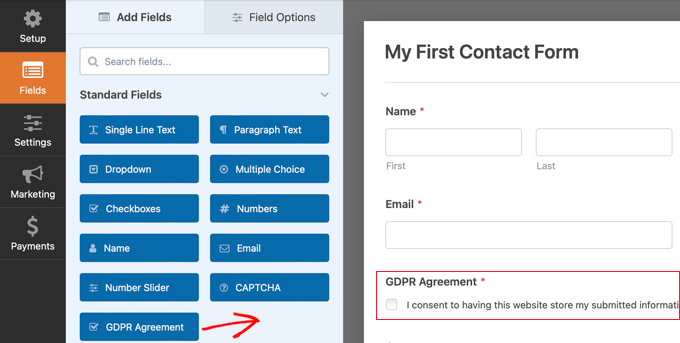
Du kan se vår steg-för-steg-guide om hur man skapar GDPR-kompatibla formulär i WordPress.
E-postmarknadsföringens anmälningsformulär
Liknande kontaktformulär, om du har några formulär för e-postmarknadsföring där användare kan anmäla sig, som popup-fönster, flytande fält, inbäddade formulär och andra, måste du se till att du får uttryckligt samtycke från användarna innan du lägger till dem i din lista.
Detta kan göras antingen genom:
- Lägg till en kryssruta som användaren måste klicka på före opt-in.
- Kräv helt enkelt dubbel opt-in till din e-postlista.
Topplösningar för leadgenerering som OptinMonster har lagt till GDPR-samtyckescheckboxar och andra nödvändiga funktioner för att hjälpa dig att göra dina e-postanmälningsformulär kompatibla.
Du kan läsa mer om GDPR-strategier för marknadsförare på OptinMonster-bloggen.
E-handel och WooCommerce-butiker
Om du använder WooCommerce, det mest populära e-handelspluginet för WordPress, då måste du se till att din webbplats följer GDPR.
Lyckligtvis har MonsterInsights-teamet förberett en djupgående guide om hur man gör en WooCommerce-butik GDPR-kompatibel.
Retargeting-annonser
Om din webbplats kör retargeting-pixlar eller retargeting-annonser, då behöver du inhämta användarens samtycke.
Du kan göra detta genom att använda ett plugin som WPConsent. Det blockerar alla spårningsskript tills användarna ger sitt tillstånd, till skillnad från grundläggande cookie-meddelanden som bara visar en varning.
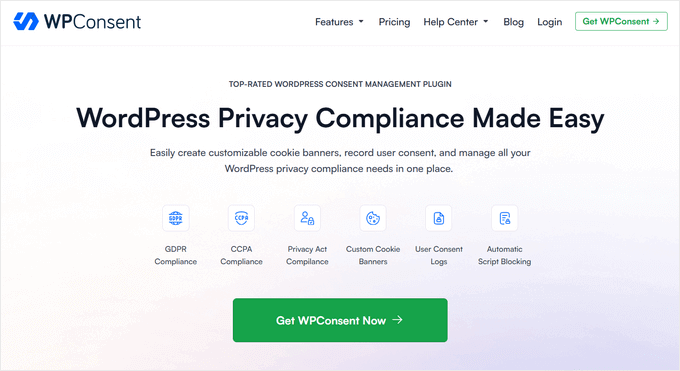
Pluginet hanterar populära tjänster som Google Analytics och Facebook Pixel samtidigt som det sparar detaljerade samtyckesregister, så att du kan köra dina marknadsföringskampanjer med vetskapen om att du är helt compliant.
Du kan hitta detaljerade instruktioner i vår guide om hur du lägger till ett cookie-meddelande i WordPress för GDPR/CCPA.
Google Fonts
Google Fonts är ett utmärkt sätt att anpassa typografin på din WordPress-webbplats.
Google Fonts har dock visat sig bryta mot GDPR-reglerna. Det beror på att Google loggar dina besökares IP-adress varje gång ett typsnitt laddas.
Lyckligtvis finns det några sätt att hantera detta så att din webbplats är GDPR-kompatibel. Du kan till exempel ladda dina typsnitt lokalt, ersätta Google Fonts med ett annat alternativ eller inaktivera dem.
Du kan lära dig hur i vår guide om hur man gör Google Fonts integritetsvänligt.
Bästa WordPress-plugins för GDPR-efterlevnad
Det finns flera WordPress-plugins som kan hjälpa dig att automatisera delar av GDPR-efterlevnaden.
Dock kan inget plugin erbjuda 100 % efterlevnad på grund av webbplatsers dynamiska natur.
Akta dig för alla WordPress-plugins som påstår sig erbjuda 100 % GDPR-efterlevnad. De vet troligen inte vad de pratar om, och det är bäst för dig att helt undvika dem.
Nedan är vår lista över rekommenderade plugins för GDPR-efterlevnad:
- WPConsent blockerar automatiskt alla spårningsskript tills besökare ger tillstånd, håller detaljerade register över användares samtycke och inkluderar lättanpassade integritetsbanderoller för att hålla din webbplats kompatibel. Det finns också en gratis version av WPConsent tillgänglig.
- Om du använder Google Analytics, rekommenderar vi att du använder MonsterInsights och aktiverar deras EU-kompatibilitets-tillägg.
- WPForms är det mest användarvänliga WordPress-kontaktformulärpluginet och erbjuder GDPR-fält, en automatisk raderingsfunktion för gamla inlägg och andra integritetsverktyg.
- Cookie Notice är ett populärt gratis plugin för att lägga till en EU-cookie-notis, och det integreras väl med toppplugins som MonsterInsights och andra.
- GDPR Cookie Consent låter dig skapa en meddelandefält på din webbplats så att användaren kan bestämma om de vill acceptera eller avvisa cookies och täcker CCPA såväl som GDPR.
- WP Frontend Delete Account är ett gratis plugin som låter användare automatiskt radera sin profil på din webbplats.
- OptinMonster är avancerad programvara för leadgenerering som erbjuder smarta riktningsfunktioner för att öka konverteringar samtidigt som den är GDPR-kompatibel.
- PushEngage låter dig skicka riktade push-meddelanden till besökare efter att de har lämnat din webbplats och är helt GDPR-kompatibel.
- Smash Balloon ger dig ett GDPR-kompatibelt sätt att bädda in liveflöden och visa inlägg från Facebook, Twitter, Instagram, YouTube, TripAdvisor och mer.
- Novashare erbjuder ett sätt för användare att dela ditt innehåll på sociala medier utan att samla in deras personuppgifter eller placera cookies.
Du hittar fler alternativ i vårt expertval av de bästa WordPress GDPR-plugins för att förbättra efterlevnaden.
Vi kommer att fortsätta att övervaka plugin-ekosystemet för att se om några andra WordPress-plugins sticker ut och erbjuder betydande GDPR-kompatibilitetsfunktioner.
Slutliga tankar
GDPR har varit i kraft sedan maj 2018.
Kanske har du haft din WordPress-webbplats ett tag och arbetat mot GDPR-efterlevnad. Eller så kanske du precis har börjat med en ny webbplats.
Oavsett vilket finns det ingen anledning till panik. Fortsätt bara att arbeta mot efterlevnad och få det gjort så snart som möjligt.
Du kanske är orolig för de höga böterna. Kom ihåg att risken att få böter är minimal. Europeiska unionens webbplats anger att du först får en varning, sedan en tillrättavisning, och böter är det sista steget om du inte följer lagen och medvetet ignorerar den.
Kom ihåg att EU inte är ute efter dig. De gör detta för att skydda användardata och återställa människors förtroende för onlineföretag.
I takt med att världen blir digital behöver vi dessa standarder. Med de senaste dataintrången hos stora företag är det viktigt att dessa standarder anpassas globalt.
Det kommer att vara bra för alla inblandade. Dessa nya regler kommer att bidra till att öka konsumenternas förtroende och i sin tur hjälpa till att växa din verksamhet.
Vi hoppas att den här handledningen hjälpte dig att lära dig hur du blir GDPR-kompatibel på din WordPress-blogg. Du kanske också vill se våra experthandledningar om hur du gör din webbplats GDPR-kompatibel.
Experthandledningar för att göra din WordPress-webbplats GDPR-kompatibel
- Hur man lägger till en GDPR-kommentarsekvitensruta i WordPress
- Hur man lägger till ett cookie-popup i WordPress för GDPR/CCPA
- Hur du vet om din WordPress-webbplats använder cookies
- Hur man skapar GDPR-kompatibla formulär i WordPress
- Hur man håller personligt identifierbar information utanför Google Analytics
- Hur du gör Google-typsnitt integritetsvänliga
- Hur du inaktiverar Google-typsnitt på din WordPress-webbplats
- Hur man lägger till en integritetspolicy i WordPress
- Hur du skapar en sida för att inte sälja min information i WordPress
Om du gillade den här artikeln, prenumerera då på vår YouTube-kanal för WordPress-videoguider. Du kan också hitta oss på Twitter och Facebook.
Juridiskt friskrivning
Vi är inte jurister, och inget på denna webbplats bör betraktas som juridisk rådgivning. På grund av webbplatsers dynamiska natur kan inget enskilt plugin eller plattform erbjuda 100 % laglig efterlevnad.
Om du är osäker är det bäst att konsultera en specialist på internetjuridik för att avgöra om du följer alla tillämpliga lagar för dina jurisdiktioner och dina användningsfall.
Ytterligare resurser
- GDPR-hysteri Del I och Del II av Jacques Mattheij
- Dataskyddsinfografik från Europeiska kommissionen
- Principer för GDPR från Europeiska kommissionen
- GDPR och MonsterInsights – allt du behöver veta om Google Analytics GDPR-efterlevnad
- GDPR-förbättringsfunktioner för WPForms – allt du behöver veta om GDPR-efterlevnad för dina WordPress-formulär
- WooCommerce och GDPR – allt du behöver veta om GDPR-efterlevnad för din onlinebutik
- OptinMonster och GDPR – allt du behöver veta om GDPR-efterlevnad och e-postmarknadsföringens opt-in-formulär
Om du gillade den här artikeln, prenumerera då på vår YouTube-kanal för WordPress-videoguider. Du kan också hitta oss på Twitter och Facebook.





Teresa Cuervo
Jag använder Jetpack-plugin för mitt kontaktformulär och statistik (bland annat). Hur gör man deras kontaktformulär kompatibelt?
Tack
Dan
En sak som folk verkar inte diskutera är kommentarsfältet. Precis här, i detta formulär, bad du mig om min e-postadress, precis som alla vanliga WP-kommentarsformulär gör. Men ingenstans talar du om för mig vad denna e-postadress kommer att användas till. Du använder den inte för uppföljning eftersom jag inte kommer att prenumerera på det alternativet.
Standardbeteendet för WP-kommentarer är bara att be om folks e-postadress men utan något särskilt syfte, vilket också strider mot GDPR, eller hur? Du måste ha ett syfte för att be om någons data nu.
Detta verkar så självklart att jag undrar vad jag missar. De tänkte uppenbarligen på kommentarer och lade till den nya kryssrutan för cookie-meddelanden, så varför nämns ingenting om insamlingen av e-postadresser från första början?
Faizan
Språket du använder för att förklara denna GDPR-fråga är otroligt unikt. ALLT i en lösning för små projekt som mitt. Genom detta får jag veta allt om GDPR och nu kan jag analysera var jag behöver förbättra mig.
Tack
Rahadian
Underbar guide, jag trodde att denna efterlevnad inte påverkade mig, även om jag undrar vad detta är för “GDPR-efterlevnad” som folk pratar om, och den här artikeln ger mig en tydlig förklaring. Nu vet jag att jag borde uppdatera min webbplats och måste följa denna efterlevnad. Tack för att du delade denna information.
Q
Tack för en mycket detaljerad förklaring OCH framför allt för att ha dämpat paniken. Jag kan nu titta på vettiga lösningar och implementera GDPR-efterlevnad på min webbplats med lätthet nu när jag vet vad det innebär.
Himadri Saha
Hej, tack för din fina, tydliga och förklarande artikel. Jag använder Sumome för att bygga upp min prenumerantbas. Har du någon aning om detta är GDPR-kompatibelt?
Redaktionell personal
Hej Himdari,
You’d have to ask the Sumo team as to what they’re doing about GDPR
Admin
Aliyy Oke
Vilken kortfattad och mycket informativ artikel. Den här artikeln har en ganska upplysande effekt på förståelsen av vad GDPR är. Ännu nu visste jag inte att den här lagen bara skulle träda i kraft från den 25 maj och det har varit mycket surr och nyheter om den här och där under lång tid nu. Tack för det underbara inlägget.
Waqas
Jag driver en nyhetswebbplats om cybersäkerhet och jag har aldrig samlat in något från någon besökare förutom e-post för att skicka läsare meddelanden om nya nyhetsartiklar.
Måste jag också gå igenom allt detta besvär? Måste vi också visa GDPR-efterlevnadspopup för besökare som vi gör med cookie-samtyckespupup?
Tack för den utmärkta artikeln.
Gary Sonnenberg
I think you’re going to get a lot of hits on this article.
Jag håller med andra om att det är den bästa som finns hittills. Tack!
Jeff Coombs
Hej!
Hur skulle jag veta – eller – vad kan jag göra på min WordPress-webbplats för att säkerställa att inga cookies används så att jag inte behöver ha cookie-varningen eller någon annan policy (GDPR etc) att oroa mig för?
(Jag har bara några "hur-man"-guider där, inget annat – inga kommentarer etc eller några kontaktformulär etc).
* Tack för att du tog dig tid att skapa detta GDPR-inlägg – mycket uppskattat!
JC.
Cheryl Harrison
Andra källor säger att GDPR endast gäller för personer/företag inom EU, INTE för EU-medborgare som råkar befinna sig i USA.
Vi har aktiverat landblockering så att vår webbplats helt enkelt inte är tillgänglig någon annanstans än i USA och Kanada.
Är det din (icke-juridiska) åsikt att vi därför inte behöver följa den?
glenda taylor
Jag har använt WP Simple Membership Plug in på min webbplats. Vad behöver jag göra för att uppdatera formulären där?
WPBeginner Support
Hej Glenda,
Enskilda plugins kommer att hantera GDPR-efterlevnad på egen hand. Vänligen kontakta pluginens support så kommer de att visa dig rätt väg.
Admin
rodrigo
Grattis till en mycket informativ och väl förklarad artikel. En mycket bra utgångspunkt för vidare läsning.
Tamara
Thank you for this
About the plugins you recommend, so you recommend downloading ALL OF THEM right?
Thank you
Tamara
Redaktionell personal
They’re all good plugins. You can use the ones that you need
Admin
Carolyn Astfalk
Detta är en mycket hjälpsam artikel. Jag har tidigare hanterat alla dessa problem på det sätt du rekommenderar, men det finns en sak jag inte kan hitta svar på trots att jag sökt och postat på flera ställen:
Vad sägs om WP-bloggprenumerationer? Ingenting i WP- eller JetPack-uppdateringarna som jag kan hitta ger den kryssrutan för samtycke för bloggprenumeranter. Kräver inte dessa e-post- och WP-prenumerationer också samtycke?
WPBeginner Support
Hej Carolyn,
De har åtgärdat några av dessa problem, för att lära dig mer, kontakta deras supportforum så kommer de att visa dig rätt väg.
Admin
Dan
Att förstå Titel 9 är nyckeln.
Här är en länk,
http://www.privacy-regulation.eu/en/article-9-processing-of-special-categories-of-personal-data-GDPR.htm
Dan
Detta är också en bra resurs,
https://www.compliancejunction.com/gdpr-for-small-business/
Citerar nedan –
Vilken effekt kan GDPR ha på småföretag?
För GDPR:s ändamål klassificeras ett litet företag som ett med färre än 250 anställda. Alla företag med fler än 250 anställda måste följa GDPR och måste utse en dataskyddsombud (DPO).
Företag med färre än 250 anställda måste följa GDPR om deras databehandling kan påverka individers rättigheter och friheter, om de regelbundet behandlar personuppgifter, eller om de behandlar uppgifter som omfattas av artikel 9 i GDPR, vilket inkluderar känsliga uppgifter som de som rör religiös övertygelse. Om något av detta gäller ett litet företag måste det säkerställa att det följer alla aspekter av GDPR.
Dan
Du utelämnar den del av GDPR som ger undantag för företag med färre än 200 anställda. Åtminstone såg jag ingen hänvisning till det.
Redaktionell personal
Jag tror att den delen är specifik för att kräva en dataskyddsansvarig. Jag håller dock med om att risken för straff är lägre för mindre företag, men det betyder inte att de inte bör göra sitt bästa för att följa reglerna.
-Syed
Admin
Brian77
WordPress 4.9.6 är inte GDPR-kompatibelt, inte alls, tyvärr. Kärninnehåll i backend som är tillgängligt för alla användarroller inklusive prenumeranter lagras på tredjepartsservrar utan information och/eller samtycke. Användar-IP lagras i databasen utan meddelande, leta bara efter session_token. Användar-IP lagras för kommentarer. Användarens e-post används i filnamnet för GDPR-dataexport. Exporterade metafält från användarprofilen är hårdkodade, exporten kommer att vara ofullständig i de flesta fall. Och det finns en hel del buggar som att integritetspolicy-sidan inte kan redigeras av redaktörer, dina kunder behöver full administratörsåtkomst för att redigera den sidan nu, lycka till med det.
Wayne Rose
Vilken bra artikel, det första vettiga jag har läst om den mystiska GDPR, jag fann att detta var informativt att börja med och även hjälpsamt med råd om plugins att lägga till på min webbplats för att hjälpa till att göra den kompatibel.
Tack så mycket, jag kan nu andas ut!
Dawson Johnson
Fantastisk artikel, tack så mycket.
Några frågor:
— När det gäller MonsterInsights, är funktionen “anonymisera IP” i gratisversionen tillräcklig för GDPR-efterlevnad när det gäller Google Analytics? Eller finns det kritisk funktionalitet associerad med betalversionen (och EU Compliance Addon)?
— Jag är lite orolig för tredjepartsannonser (via nätverk som Taboola, RevContent, etc.). Vad exakt krävs och inte krävs av utgivare med tanke på att vi på inget sätt kontrollerar eller bearbetar den data som de samlar in / cookies som de lagrar?
— När det gäller cookie-plugins, finns det några som A) faktiskt blockerar tredjepartscookies på din webbplats baserat på bristande samtycke eller avanmälan och B) kan geotargetas till EU-användare?
Jag är en amerikansk utgivare, så jag vill inte visa opt-out-meddelanden (och riskera att tappa spår / annonsintäkter) till besökare som är utanför Europa.
WPBeginner Support
Hej Dawson,
Se MonsterInsights blogginlägg för mer information.
Du måste kontakta varje nätverk, och troligtvis kommer de redan att ha dokumentation om hur man förbereder sig för GDPR-efterlevnad.
När det gäller cookie-plugins kommer det säkert att komma fler plugins för att hantera olika krav.
Admin
stefan
Hej,
Att inte identifiera personer som skriver på din blogg kan vara farligt för många webbplatser. Om någon hotar att stämma dig och du har försäkring, tror jag att du måste informera om det och kunna identifiera personen så att du kan skydda dig mot rättsliga anspråk. Som ett resultat kan du inte begära samtycke eftersom om du gör det, har personen rätt att bli bortglömd. Så jag använder berättigat intresse. Förresten, jag tycker att integritetspolicyn som erbjuds av WordPress saknar vissa GDPR-krav, såsom identifiering av den rättsliga grunden för varje behandling.
Stephanie Markou
Utan tvekan en av de bästa artiklarna om GDPR-efterlevnad när det gäller plugins och webbplatser. Har du några exempel på integritetspolicyer som visar datakategorier och GDPR-kompatibla villkor som skulle täcka plugins i allmänhet (istället för att lista varje enskild plugin som används på en webbplats). Tack!
Elvis Nyamekye
Hej, jag ville bara säga tack för att du skrev den här artikeln. Förstod inte riktigt denna GPDR-uppdatering förrän idag. Tack så mycket.
McCool Travel
Underbar guide till GDPR. Svarar på många av de frågor jag hade. Tack.
Riccardo
Den bästa artikeln om GDPR-efterlevnad för Wordpress som jag har läst hittills! Tack!
Redaktionell personal
Thanks Ricardo
Admin
Eleni
Hej, tack för all denna information men jag har en sista fråga. Min blogg är personlig, vilket innebär att jag inte ger analyser eller data till någon, eller så har jag inga annonser.
Har jag fortfarande en skyldighet att följa de nya reglerna?
Tack på förhand
Redaktionell personal
Hej Eleni,
According to the regulation, yes if you have a website (personal or business or anything else) you would still have to comply. You can wait and see how they enforce it on small personal blogs since there is no precedent of that yet, but if all you have to do is anonymize IP addresses on your analytics, then it’s not that big of a deal
Admin
Trish
Tack för den utmärkta artikeln. Jag använder din plugin för att infoga rubriker och sidfötter, hur anonymiserar jag IP-adresser i den?
Redaktionell personal
Det pluginet ger dig bara möjlighet att lägga till skript. Det har inte funktionalitet som att anonymisera IP-adresser eftersom det är specifikt för enskilda skript som du kanske laddar.
Andrei
Hej grabbar,
Först och främst tack för den här fantastiska artikeln.
Jag har en fråga angående verktyget för export av personuppgifter.
Om jag har förstått det rätt kan en användare få tillgång till sina personuppgifter genom att kontakta administratören och vänta på ett e-postsvar. Jag kan ha fel, men det är inte ett särskilt användarvänligt tillvägagångssätt. Och det lägger också en stor börda på administratören om man arbetar med en stor användardatabas.
Finns det ett sätt att göra denna process automatisk? Kanske ett plugin som automatiskt exporterar och laddar ner användaren, istället för att administratören gör det manuellt?
Skål,
Andrei
WPBeginner Support
Hej Andrei,
Förhoppningsvis kommer det snart att finnas några plugins tillgängliga för att automatisera processen. Just nu måste en användare kontakta en administratör.
Admin
Peter Derek
Tack för din informativa artikel som jag kommer att läsa mer noggrant. Jag känner mig dock skyldig att vid denna tidpunkt nämna en fråga som har fångat mitt öga. Du nämner 'EU-medborgare' och 'EU-bosatta' vilket är felaktiga termer. Ingen kan vara lagligt bosatt i EU som sådant, utan endast i sina respektive länder. EU är inte ett land, utan en byråkrati som i grunden är en ekonomisk enhet som möjliggör frihandel mellan sina separata medlemsstater och har egna regler som medlemsstaterna är bundna av. Europas länder ligger geografiskt på en landmassa, men varje land har sin egen identitet och kultur. Därför skulle det vara mer korrekt att hänvisa till GDPR i termer av relevans för medlemsländerna.
Redaktionell personal
Hej Peter,
Jag är glad att du fann artikeln hjälpsam. Mitt mål med den här artikeln är att bryta ner saker till dess enklaste nivå. Även om distinktionen finns på lokal nivå, betraktas för den här artikels skull alla långvariga invånare i ett EU-medlemsland som EU-invånare.
Lagen antas av EU som helhet med underskrifter från varje medlemsland.
Admin
Benjamin
Detta är den bästa guiden jag har läst hittills om GDPR. Tack så mycket!
Redaktionell personal
Thanks Benjamin, glad you found it helpful
Admin
Agnes
Tack för den detaljerade informationen? Utöver de juridiska sakerna behövs praktisk hjälp och verktyg för att göra det möjligt här.
Redaktionell personal
Hej Agnes, vi har lagt till verktygen i den här artikeln som kan hjälpa dig att automatisera delar av GDPR-processen.
Admin
Che
Hej, kan vi skriva vår egen integritetspolicy eller behöver vi en advokat?
Kan vi också kopiera integritetspolicyn från en annan webbplats (vissa meningar)?
Redaktionell personal
Hej Che,
Du kan absolut använda standard WordPress integritetspolicy via generatorn i 4.9.6. Se bara till att lägga till allt du samlar in eftersom det inte finns något som passar alla.
Admin
Sieglinde
Jag är fortfarande förvirrad. Min webbplats har en knapp "Lägg i varukorg" men kundvagnen finns på PayPal, inte på min dator. De meddelar mig när jag har en beställning via e-post så att jag kan skicka till det namn och den adress som anges för den beställda varan. Jag har inte hört ett ljud från PayPal om dessa regler. Jag lagrar inget annat än köparens namn och den leveransadress som ges till mig.
Om folk registrerar sig för min wordpress.com-blogg för att "följa", har jag bara deras e-postadress och har faktiskt aldrig personlig kontakt med dem. Så vad behöver jag göra?
Redaktionell personal
Hej där,
Du skulle behöva uppdatera din integritetspolicy och lägga till vilken information du lagrar. Lägg till en cookie-notis på din blogg om du lägger till cookies i användarens webbläsare och det är allt.
Admin
Mark Corder
Enligt denna (mycket hjälpsamma!) artikel har WP 4.9.6 nu kommentarssamtycke som standard. Jag kör alltid den senaste versionen (och jag har den nya integritetsinställningen) men jag ser inte detta visas på mina kommentarsformulär, och jag ser inte heller något sätt att aktivera det. Jag kör en "prenumerations"-plugin (Subscribe to Comments Reloaded) och det är allt jag ser. Kan detta blockera det? Annars, hur aktiverar jag den här funktionen?
Redaktionell personal
Hej Mark,
WordPress 4.9.6. lade till rutan för kommentarssamtycke som standard. Är du utloggad när du kontrollerar detta?
Admin
Mark Corder
Ja – jag har loggat ut, rensat både WP-cachen och webbläsarens, tvingat fram uppdateringar, provat olika webbläsare … allt jag kan komma på. Jag installerade en ren version av WP 4.9.6 på en testserver UTAN några plugins, och jag kan se den där – men inte på någon av de live-sajter jag hanterar.
Jag försöker fortfarande saker ... Om jag upptäcker problemet, meddelar jag dig. Under tiden, har någon några idéer?
Mark Corder
OK, efter mycket läsning och grävande i WP-filerna verkar detta vara ett problem med vissa teman. Från och med WP 4.9.6 lades en parameter för "$cookies_consent" till, och medan nästan alla teman har sina egna kommentarsformulär, kommer många av dem inte att använda denna parameter – därav faktumet att den inte visas. För mer information om vad som händer här (och behöver hända), se den här artikeln på WordPress.org: https://make.wordpress.org/core/2018/05/17/changes-that-affect-theme-authors-in-wordpress-4-9-6/ .
Även om detta förklarar problemet och erbjuder en lösning, är jag rädd att denna nivå av hackning för att inkludera en ny parameter i arrayen kan vara bortom den genomsnittliga personen som WPBeginner fokuserar på... Så vad ska man göra?
* Kontakta din temas skapare och fråga om de planerar att uppdatera sitt tema för att inkludera denna parameter … och lycka till.
* Byt till ett tema som är GDPR-kompatibelt och som visar detta kryssruta-alternativ på kommentarsformuläret. (De "medföljande" WP-teman som Twenty Seventeen och liknande har alla uppdaterats för att visa det.)
Jag förutspår att du i framtiden kommer att få många frågor om just denna fråga – du kanske till och med vill skriva en dedikerad artikel om den!
Och medan jag väntar på svar från ett par temautvecklare, planerar jag att kavla upp ärmarna och försöka lägga till den här parametern själv. (Säger den orädda kodhackaren – som använder barn-teman och säkerhetskopierar allt först!)
Jag hoppas att detta hjälper till att förklara varför den här funktionen förmodligen inte visas för många andra ... och fortsätt med det goda arbetet, gott folk!
Redaktionell personal
Thanks for the link Mark. We’re going to work on getting this guide up ASAP
Marge
Rutan för kommentarssamtycke visas inte för mig heller. Jag är utloggad och använder en inkognitobläddrare. Jag har sett andra säga samma sak i ett annat forum.
Maria Spyrou
Hej! Det verkar som att jag har samma problem här! Jag kör Wordpress 4.9.6 och det finns ingen samtyckesruta för kommentarer. Det säger sig självt att jag inte var inloggad när jag kontrollerade. Några idéer?
Laura Weed
Och vad gör vi med Wordpress.com-bloggar? Jag skrev en integritetspolicy och aktiverade meddelandet om cookies, även om det inte försvinner när man klickar på acceptera och stäng.
Du glömde också artikel 21. Om din webbplats är tillgänglig och samlar in data från EU-medborgare, men du inte är baserad i EU, måste du ha en representant som ÄR baserad i EU om en lokal tillsynsmyndighet behöver få tag på dig. Detta är obligatoriskt.
Redaktionell personal
Hej Laura,
Dataskyddsombud är inte obligatoriskt. Du kan granska infografiken som vi länkade till i avsnittet med ytterligare resurser i den här artikeln, som är från Europeiska unionen själva.
Detta står det angående en dataskyddsombud (DPO):
"Detta är inte alltid obligatoriskt. Det beror på typen och mängden data du samlar in, om bearbetning är din huvudsakliga verksamhet och om du gör det i stor skala."
Jag är säker på att fler tjänster kommer att dyka upp och erbjuda representativa tjänster i stor skala till överkomliga priser.
Admin
Karin
This is good news .. unless I’m missing something loll

Guess this means that WP will stop sharing our IP’s addresses every time we comment – was not crazy about that .. Wish I knew that before to ensure my VPN’s always active loll But I was a newbie n guess I missed it
All good. I love WP, I love blogging there; been meeting some really great people. Thanks
Mike C
“världen över (inte bara inom EU).”
Snälla, jag skulle vilja veta källan till denna information. EU-lagar gäller inte, och kan inte tillämpas på amerikanska medborgare. Som jag förstår det, kommer GDPR endast att gälla multinationella företag, dvs. de som har någon affärsenhet/enheter registrerade i EU. Vänligen ange den amerikanska lagen som säger att GDPR-regler gäller för amerikanska medborgare som driver en verksamhet utanför USA. Jag har inte kunnat hitta någon, och ingen har kunnat peka mig till en hittills. Jag tror att all denna skrämselpropaganda är helt fel. EU-regler gäller inom EU och USA-regler gäller i USA. USA har sina egna integrelaterade lagar. Vänligen ge råd?
Redaktionell personal
Hej Mike,
Genom att bedriva affärer online och göra din webbplats tillgänglig för hela världen, utsätter du dig för jurisdiktionen för varje stat och land. Det är ett ganska vanligt argument att EU-lagar som GDPR inte gäller här i USA. Det stämmer faktiskt inte. Vi har bara inte sett dem strikt tillämpade på företag utanför EU (eller stora multinationella företag). Det betyder inte att det inte kan hända.
En utländsk regering eller enhet kan väcka ett rättsligt fall mot dig (av vilken anledning som helst), vinna i sin respektive jurisdiktion och ansöka om ett domstolsbeslut i din lokala jurisdiktion för ett fordringsanspråk. Som du kan föreställa dig är kostnaden för detta mycket hög, och det är därför det inte händer ofta.
Att säga att det inte kan hända vore dock ett misstag.
Återigen, jag är ingen jurist, och som jag nämnde i artikeln ovan, folk kommer inte att få böter direkt. Du får en varning först, sedan en tillrättavisning och sedan böter. Mycket skrämselpropaganda görs just nu kring böter, och jag ville klargöra det här i artikeln.
-Syed
Admin
Neghie Thervil
Eftersom du inte är jurist, kanske det är bäst att inte ge den här typen av råd. Det finns mycket desinformation i din kommentar och det är den typen av information som orsakar utbredd onödig panik.
Barbara Holtzman
Eftersom "EU" lanserade två massiva stämningar mot Alphabet (Google och Android) och Facebook så snart lagen trädde i kraft, är det ganska tydligt att denna lag var och är en tunn slöja för att "få tag på" dessa två företag.
Som en en- till ibland trepersoners verkstad, med ett företag som sällan omsätter mer än 1 000 dollar (även om jag hoppas kunna öka det till 10 000 dollar över tid), kan EU få roligt med mig för de par dollar i böter de kan få.
Mer troligt är att jag helt enkelt blockerar alla IP-adresser som inte är från USA [Israel kan också vara kvar, EU kommer aldrig att släppa in dem], och vägrar att kommunicera eller göra affärer med någon i EU. Eftersom det mesta av den forskning jag gör ändå är baserad i USA, och akademisk forskning dessutom, är det mest troligt att ingen kommer att bry sig.
Jag har alltid haft en policy för dubbel opt-in, delar ingen information med någon, och min data är dubbelanonymiserad med en proprietär algoritm. Jag har inget emot att lägga till alla cookie- och integritetsvarningar och sådant, så jag följer förmodligen ändå reglerna. Men jag gillar inte att EU dikterar vad resten av världen kan och inte kan göra.
Jag hoppas att Google och Facebook drar sig ur EU tillsammans med mig. Att se det och efterdyningarna kommer verkligen att bli ett skämt.
Christine Robinson
Vilka är reglerna för en icke-värdbaserad WordPress.com-webbplats? Används endast för personliga inlägg, inte för marknadsföring av något. Men jag har världsomspännande följare. Märkte att du bara adresserade WordPress.org. Tack!
Redaktionell personal
Hej Christine, allt vi gör på WPBeginner fokuserar på att hjälpa användare av självhostad WordPress.org.
Jag skulle rekommendera att kontakta WordPress.com-teamet för att se vad de gör angående GDPR för sina värdbaserade webbplatser.
-Syed
Admin
Vatsala Shukla
Tack för det enkla, raka inlägget. Jag har delat det vidare i en Facebook-grupp där en av gruppmedlemmarna hade oro kring GDPR. Tack för att du validerade min förståelse av GDPR och vad vi behöver göra för att följa reglerna utan att känna oss överväldigade.
Redaktionell personal
Cheers
Admin
Luis Aquino
Tack, tack, tack för en lättförståelig artikel!
Redaktionell personal
You’re welcome Luis
Admin
Christos
Hej,
Jag har använt gratisversionen ett tag och kunde inte vara nöjdare.
Men när det gäller GDPR-integrationen, är det bara tillgängligt med en betalplan?
Tack för ett bra plugin! (Redan prenumerant och glad att förbli en)
Christos
Redaktionell personal
Hej Christos, vilken plugin pratar du om?
För MonsterInsights är tillägget för EU-efterlevnad endast tillgängligt i betalda planer. För WPForms har det förbättringar för både Lite- och Pro-användare (beroende på individuella behov).
Admin
Carole
Vår webbplats är för vår organisation och är av informativ karaktär. Vi säljer inget eller har en blogg. Måste jag fortfarande vara GDPR-kompatibel?
Redaktionell personal
If you’re storing user’s data or adding cookies to their browsers, then yes
Admin
Vidya SUry
Det där är en koncis guide. Jetpack erbjuder cookie-bannern med en cookiepolicy. Idag fanns det ett popup-fönster i instrumentpanelen som meddelade om hjälp med WP:s integritetspolicy – som hjälpte till att fylla i rubrikerna för integritetspolicyn.
Min fråga är: varför skulle man behöva ett GDPR-plugin när WP:s verktyg finns tillgängliga?
Dessutom, hur fungerar export/radering av data? Varifrån begär webbplatsbesökare den informationen?
Tack Syed
Redaktionell personal
Inte alla kommer att behöva tredjeparts GDPR-plugins. Det beror på vilken typ av webbplats du har och dina behov. Om du använder Google Analytics, då skulle du behöva MonsterInsights EU compliance addon som antingen anonymiserar IP-adressen eller integreras med ett plugin för cookie-meddelanden.
Att lägga till en e-postadress i din integritetspolicy som en besökare kan använda för att mejla dig för att begära dataexport/radering skulle fungera tillräckligt bra. Alternativt kan du använda ett formulärplugin som WPForms för att skapa ett formulär på din webbplats för detta.
Admin
Fernando Tellado
Hej!
Tyvärr är WordPress inte GDPR-kompatibelt eftersom det saknar det första informationslagret som måste godkännas av användaren. De senaste versionerna av WordPress sparar inte bara kakan utan har inte heller någon plats där man kan informera användaren om att deras namn, IP, e-post etc. kommer att sparas i databasen, och har inte den (inte markerade) kryssrutan för att godkänna lagring av dessa personuppgifter.
Märkligt nog kommer WooCommerce nästa version att inkludera denna typ av funktion i den nya fliken Sekretess & Konton.
Kramar!
Redaktionell personal
Låt oss se om WordPress lägger till det. Jag är inte jurist, men enligt min mening kan detta hanteras i integritetspolicyn. När användaren skickar in kommentaren förstår de att denna information lagras. Men om du vill använda deras information för något annat än att bara visa kommentarer (dvs. skicka en kommentaravisering, e-postutskick etc.) måste du inhämta ytterligare samtycke.
I also expect a lot more plugins to come out to solve GDPR related issues
Admin
Alison Rayner
Tack för att du producerade en lättförståelig och följbar artikel om GDPR – första gången jag har stött på något som är relevant och skär igenom allt jargong!
Redaktionell personal
Glad you found it helpful Alison
Admin
Pat Sonnenstuhl
Jag genomför inga finansiella transaktioner, och lagrar ingen information på mina webbplatser. Jag tar inte betalt för mina webbplatser. behöver jag fortfarande gå igenom dessa kostsamma procedurer?
Pat
Redaktionell personal
Hi Pat, if you’re not using Google Analytics or adding any cookies to user’s browser, then you don’t need to do anything
Admin
Farukh
Tack så mycket för att du publicerade den här artikeln. Jag har väntat länge på att få höra dina tankar om GDPR. Det är hjälpsamt och speciellt enkelt engelska. Tack så mycket för hjälpen i den här frågan.
Redaktionell personal
You’re welcome Farukh
Admin
Julie Strietelmeier
Jag skulle vilja veta vad jag ska göra med Amazon-affiliate-länkar. Hur blir vi kompatibla med dem? Jag har försökt fråga Amazon men de ger ingen rådgivning.
Redaktionell personal
Beroende på vem du frågar får du olika åsikter. Vissa kommer att säga att eftersom hänvisningskakorna inte läggs till på din webbplats behöver du inte göra något angående affiliatelänkar (det är handlarens ansvar).
Andra kommer att rekommendera att använda en cookie-notis på din webbplats och lägga till en sektion för affiliatelänkar i din integritetspolicy.
Admin
Julie Strietelmeier
Jag har försökt hitta någons integritetspolicy där de nämner affiliate-länkar från Amazon och andra som Skimlinks men har inte lyckats än. Känner du till någon som jag kan "låna"?
Redaktionell personal
Ännu inte, men vi kommer att uppdatera vår integritetspolicy för att lägga till det inom de närmaste dagarna.
Christos
Det är faktiskt vettigt – cookie-meddelande och affiliate-meddelande. Jag använder ett affiliate-meddelande i sidfoten på min webbplats och ett cookie-samtycke.
Så länge vi är transparenta med allt vi gör kan det inte finnas några invändningar – teoretiskt sett!!!
Christos
Dave Soucy
Bra gjort. Jag kommer att skicka mina klienter för att läsa detta istället för att uppfinna hjulet på nytt och skriva min egen version.
Redaktionell personal
Thanks Dave – glad you found it useful
Admin
Kichtrickster
Tack för artikeln, bra poänger! Jag känner mig ärligt talat redo, men ändå som att jag efter några dagar kommer att upptäcka saker som är helt nya för mig.
https://www.omnisend.com/blog/gdpr-hub/the-3-foundations-of-the-gdpr/ till exempel här säger de att du till och med behöver samtycke för att se och spara deras IP-information och sådant, och mycket mer. Så jag menar, håller de inte med om cookie-policyn? Synd då, kan inte följa dem längre. Verkligen otur.
Redaktionell personal
Ja, du behöver deras samtycke för att lagra IP-information. Det är därför vi i vår guide rekommenderar att du anonymiserar IP för Google Analytics och använder Cookie Notice eller liknande lösning för att få tillstånd.
Admin